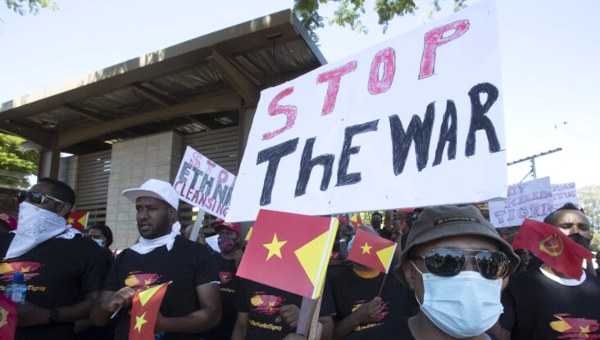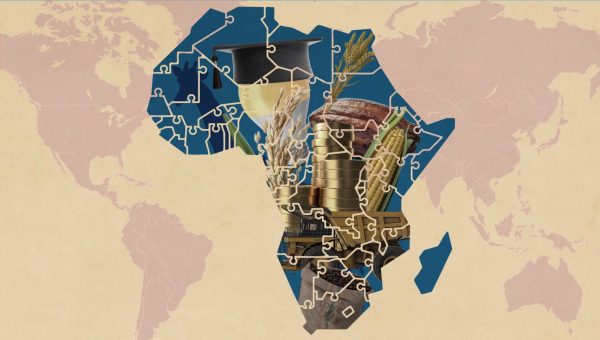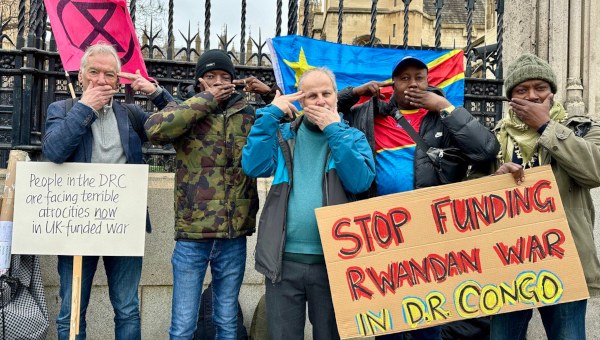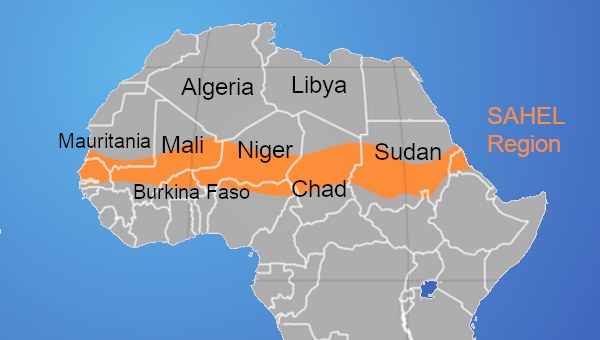Ethiopia: Between Famine and Military Stalemate
During the liberation war from the mid-seventies to the early 1990s, Paulos Tesfagiorgis was head of the Eritrean Relief Agency (ERA), the central organism that organized the provision of goods in the liberated areas of Eritrea and supported the Eritrean People’s Liberation Front (EPLF) shadow state they had set up throughout the country until their victory in 1991. As a senior member of the EPLF, Tesfagiorgis was involved, along with Isaias Afwerki, in the core leadership until the end of the 1990s, when serious cracks occurred within the government and the party, which led to the imprisonment and exile of many leaders, including Ministers and journalists and Tesfagiorgis.
Later, the anti-democratic drift continued through ups and downs that have made Eritrea one of the poorest, most repressed and deprived African countries. In parallel, the Afwerki regime has been involved in many wars, resuming military confrontation (1999-2002) with Ethiopia and various regional interventions in the Sudan and Somalia. In the meantime, Tesfagiorgis, like many of his fellow compatriots and former leaders of the Eritrean revolution, have tried to bring the vast Eritrean diaspora together around a programme of peaceful change. The current war in Ethiopia in which Eritrea is also involved could lead to another case of devastation affecting the whole region.

Pierre Beaudet (PB): The war has continued for the last three months without an apparent victory for one side or the other. What is happening on the ground?
Paulos Tesfagiorgis (PT): One thing that is certain is that the Tigray People’s Liberation Front (TPLF) seems to have survived the onslaught by Eritrean forces, Ethiopian Federal Forces, Amhara militias, UAE drones and, some say, Somali forces who were thrown into the war theatre as they were in military training in Eritrea. By most accounts, the Tigrayan armed forces, which are now calling themselves the Tigray Defense Forces (TDF),1 are inflicting heavy damage on the Ethiopian army. Even a few kilometers from the capital, Mekelle, fighting continues, causing many casualties on the Ethiopian side as well as destruction of military hardware. Some Federal Government soldiers have been taken prisoner by the TDF. Some have been released and are living evidence of the incapacity of the Ethiopian strategy to finish the disagreement militarily and declare victory.
The elite units of the TDF are led by former senior and middle-ranking officers of the Ethiopian army, as well as by former TPLF fighters. They have the advantage of knowledge of the terrain and the support of a very large part, if not the entirety, of the population. Of course, it is not easy to know exactly what is happening, but one indicator is the silence of the Ethiopian authorities on the current military confrontation. It was normal for the Federal Government to use the media to demonstrate its success, even when they arrested old people who were not in the fighting forces or active bureaucrats. Also, when they have made any advance, the government has tended to boost and exaggerate its victories. But now they are mostly silent, with no images to demonstrate their claimed success.
PB: Why is it that the Ethiopian army cannot win victory?
PT: The Federal Army is just like any other army that is well equipped with military vehicles and heavy weapons, supported by war planes and attack helicopters, and in this case, even drones. It is, for sure, heavily engaged in its mission of death and destruction. There is vast and, indeed, indiscriminate killing of civilians, and widespread destruction of property, including facilities such as hospitals and health clinics, schools, and factories, as well as places of worship, etc. 80% of health facilities have been closed or destroyed. But this army is not facing another standing army where it can see and unleash its destructive potential. It is also an army that, at the beginning of the conflict, lost more than 17,500 experienced members who were expelled because they were Tigrayans. On the other hand, the air cover they had hoped to obtain from their Emirate backers does not seem to be continuing. Reports indicate that, on the ground, the fighting is mostly led by Eritrean soldiers and ill-disciplined Amhara militias on a revenge mission.
PB: What about the rising tensions with Sudan?
PT: This seems to have caught the world by surprise. Although the border dispute in this area is nothing new, we did not anticipate such a heightened armed confrontation between the two in such a short time. They have been attacking each other, insinuating that they are both serving other parties: the Eritrean army supporting Ethiopia in its fight against the Sudan, the Sudan doing the bidding of the Egyptians. It is easy to imagine both Egypt and Eritrea being drawn into the conflict.
At this stage, I do not think there is any question about where Sudan stands in the conflict. It has been the practice in the region for governments to support opposition groups in the other country – a typical case of “my enemy’s enemy is my friend.” So, Ethiopia has sealed the border areas adjacent to Tigray. But it is a matter of time and an issue of balance of forces. If the Tigrayans continue to resist and inflict damage on their enemy, they will be able to get close to the border with Sudan, and thereby, secure a supply line.
PB: What about the border war?
PT: There is no indication that Ethiopia and Sudan are about to resolve their border issues through negotiations, although South Sudan has taken it on itself to mediate, and its representatives have been shuttling between the respective capitals. The Saudis have also offered to help in finding a solution. The position of the UAE is not known but, given that the Chief of Staff of the Ethiopian National Defense Force, General Berhanu Jula, is on an official visit to the United Arab Emirates (UAE) as we speak (Feb. 22), it’s anyone’s guess. All the indications are, so far, that both sides are hardening their positions, with Sudan recalling its ambassador from Ethiopia. One interesting statement from the top Sudanese leader, Al-Burhan, Chairman of the Sovereign Council, seems to shed light on the situation, on the one hand, and confusion on the other. Sudan’s move to secure its land on the border with Ethiopia at that particular moment was, according to Al-Burhan, based on the agreement, reached with PM Abiy a few days before Nov. 3, that if the Sudanese prevented the TPLF from accessing and using the border areas, then they could reclaim and secure their land.
PB: Anti-Ethiopian demonstrations are starting to take place in the cities of Tigray …
PT: Students are blocking streets in Mekelle. Many have been shot – 27 are known to have been killed recently. Collaborators with the occupation are killed. Religious leaders sent by Addis to calm devoted believers, both Christians and Muslims, have basically been shunned and shouted down by those who attended the meetings. It appears that this civil disobedience is growing all over the urban centers, making the region ungovernable and the occupation untenable.
PB: Is this situation likely to shift?
PT: The Tigrayans are now on a diplomatic and political offensive. They have expressed their readiness to enter peace negotiations. They state they had to resort to fighting, as all avenues for peace were closed, and their very survival was at stake. They have put up preconditions for peaceful resolution of the conflict (see below).
One can be sure that the Tigrayans are working hard to get access to Sudan, which has its own grievances against Ethiopia, as we saw earlier. On the other hand, they are counting on the fact that the traditional backers of Ethiopia, namely the European Union, the United States, and even China, are obviously not happy with the way the conflict is going, the way it is portrayed, and the contradictory statements being issued by the government. They are also especially worried about the risk of a huge humanitarian crisis in the making that is already well advanced, and the lack of serious efforts to overcome the looming tragedy on the part of the government.
On the other hand, there are already signs in Addis Ababa of a certain war-fatigue, especially as it has destabilized the economy with huge price increases (up to 100% in some staple items). A lot of people are now realizing that this war is going to be very destructive and very costly, even though they are far away from the main theatres of combat. We can hear comments in the private media outlets about how the government is not telling the truth, how the prices of essential commodities are sky-rocketing, how subsidies that supported the poor have been taken away. Looking at the recent history of Ethiopia, it is when the Addis population rose in opposition to government anti-people policies and practices that regimes fell.
On the involvement of Eritrea, some Ethiopians see it as a shame that this great Ethiopia needed outside support to contain its own internal conflict. Some question what this means to the cohesiveness of Ethiopia and the implications for peaceful political dialogue without having to call on outside forces to intervene in internal affairs, etc.
PB: What about dissent by the Oromos?
PT: Prominent Oromo leaders have been put in jail. They are on hunger strike. That appeared to have dampened the fire. But they are less and less quiet. The OLF claims to be setting up its own government structures. It has also vowed to boycott the coming elections in May-June. In the meantime, as a precaution to avoid major disturbances, thousands of young Oromos are being detained; many are killed. The old iron fist has come back with a vengeance. A reign of fear dominates. But for how long? There are disturbances, ethnic based killings, and destruction of property in other parts of Ethiopia too. Several thousand are crossing into the Sudan as refugees. The flow seems to be continuing.
PB: What could be the tipping point?
PT: Unless urgent steps are taken, in a couple of weeks it is possible that we are going to see bodies piling up from starvation. At least 4.5 million people are food insecure (including 2.2 million children). Humanitarian aid is arriving slowly and not everywhere. The Ethiopian government declared yesterday (Feb. 24) that unimpeded access has been given to humanitarian agencies as well as to major international media to see and report. In the meantime, it is heart-breaking to see information coming out that Eritrean forces have been and are plundering, killing people, even priests and elders, destroying crops, animals, churches, and buildings.
Information is being compiled by international human rights organizations and even by the Ethiopian Human Rights Commission, a government body but one which operates independently of the Executive in Addis. It is a nightmare. But can the world watch another massacre without responding, like they did in Rwanda? Famine is politically created. It can only be addressed politically, not simply through humanitarian action, as important as that is.
PB: Is the European Union in a position to intervene?
PT: The EU is very clear. It has halted about 100 million euros of budgetary support that should have been delivered to Ethiopia. Following the visit by special EU envoy Pekka Haavisto (the foreign minister of Finland), the EU is demanding humanitarian access to assess the damage, the need, and the delivery system required. The Ethiopian government seems to have developed this great propaganda claiming it is allowing access and it is ready to support humanitarian measures. In practice, it obstructs independent delivery of life-saving food items, whether from local or international humanitarian sources.
PB: The Tigrayans have now launched a call for negotiations…
PT: It appears timely since the fighting is at a stalemate, and public opinion is turning against the policies of [Ethiopian Prime Minister] Abiy Ahmed Ali. It reflects, I believe, a sort of confidence on their side that they can hold on. It is also a sign of political maturity.
The government of Tigray is ready to engage in peaceful negotiations if, and only if, the following preconditions are fully actualized:
- The alien invading force of Eritrea should leave the land of Tigray immediately. And the fact that it has left has to be confirmed by independent international body.
- The sovereign territory of Tigray should be secured and those enemies of ours who are engaged in partitioning the land of Tigray to the south, North West, west, and east leave the areas and the territorial integrity of Tigray is secured.
- The interim administration set up by Ethiopia should be dismantled and the administration of Tigray, which has been elected by the people, allowed to return to its place.
- An international independent investigative body must be instituted and freely investigate the genocide and war crimes that have been inflicted on the people of Tigray.
- More than 4.5 million people of Tigray, who were displaced and exposed to severe social crisis as the result of the invading forces should be made to receive emergency humanitarian aid; the international organizations that come to give humanitarian aid should be given unrestricted access.
- The politicians and other children of Tigray who are arrested as the consequence of the present situation should be released without any preconditions.
- The peace negotiation must be mediated by an independent international body.
February 19, 2013
PB: Is this call for negotiations likely to be heeded?
PT: Immediately no, because it would be a huge defeat for Ethiopia which started the war and the occupation, asserting that it would rapidly get rid of the “TPLF bandits.” But the stalemate continues and if enough pressure is sustained internally and externally, something might happen. In substance, Tigray is not demanding secession. They are not calling for the destruction of the Ethiopian state. Which, I think, is wise. But how long can the federal government refuse to see the bigger picture? Demonizing and harassing Tigrayans everywhere does not help reconciliation and the rebuilding of Tigray and Ethiopia together. The north is needed as well as the center, east, west, and south. All Ethiopians are needed to rebuild the country, to give the colorful land its authentic beauty and strength.
PB: What is Eritrea doing in the meantime?
PT: The Eritrean presence has been significant, perhaps even decisive. Most probably, the Federal Defense Forces would not have been a match for the battle-hardened, well trained, and highly motivated Tigrayans. Eritreans, apparently, are well trained, younger, and with a motivation that has come from years of anti-TPLF and anti-Tigray propaganda that has portrayed Tigray as a mortal enemy. Although the Ethiopian PM and official pronouncements have been denying the Eritrean presence, it has come out, not only through independent sources, but also perhaps in a haphazard manner, when the Federal government sources admitted that Eritreans are indeed in Tigray. In the meantime, the Eritrean President, Isaias Afwerki, appears to be operating behind the scenes but also openly on the Ethiopian matter, even talking about a “future federation,” while offering Ethiopia the use of the port of Assab, allowing it direct access to the sea, and, one can imagine, thereby the rebuilding of its naval forces.
Of course, this might be appealing for Ethiopia, but too many political and military leaders are skeptical, considering Isaias’s devious track record. In the meantime, things are getting more and more complicated in the relationship between Isaias and Abiy, as well as between Eritrea and Ethiopia. What is new? It is clear there are agreements being concocted by the two leaders. It is also clear the Ethiopian PM is acting as a junior partner. It is even said that the Eritrean leader, not satisfied with ruling a small Eritrea, wants to take Eritrea back into a federal relationship with Ethiopia and to assume a leadership position there. Unless something like a gigantic collapse occurs, this is nonsense.
In any event, we see a future of heightened conflicts, not peace, stability, and inclusive development, taking place in the Horn of Africa region. •





